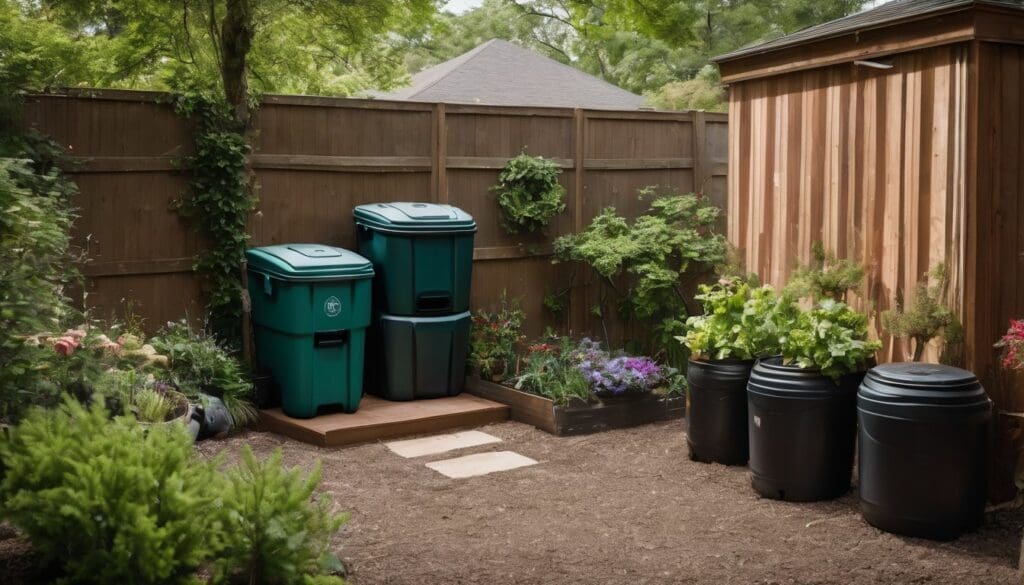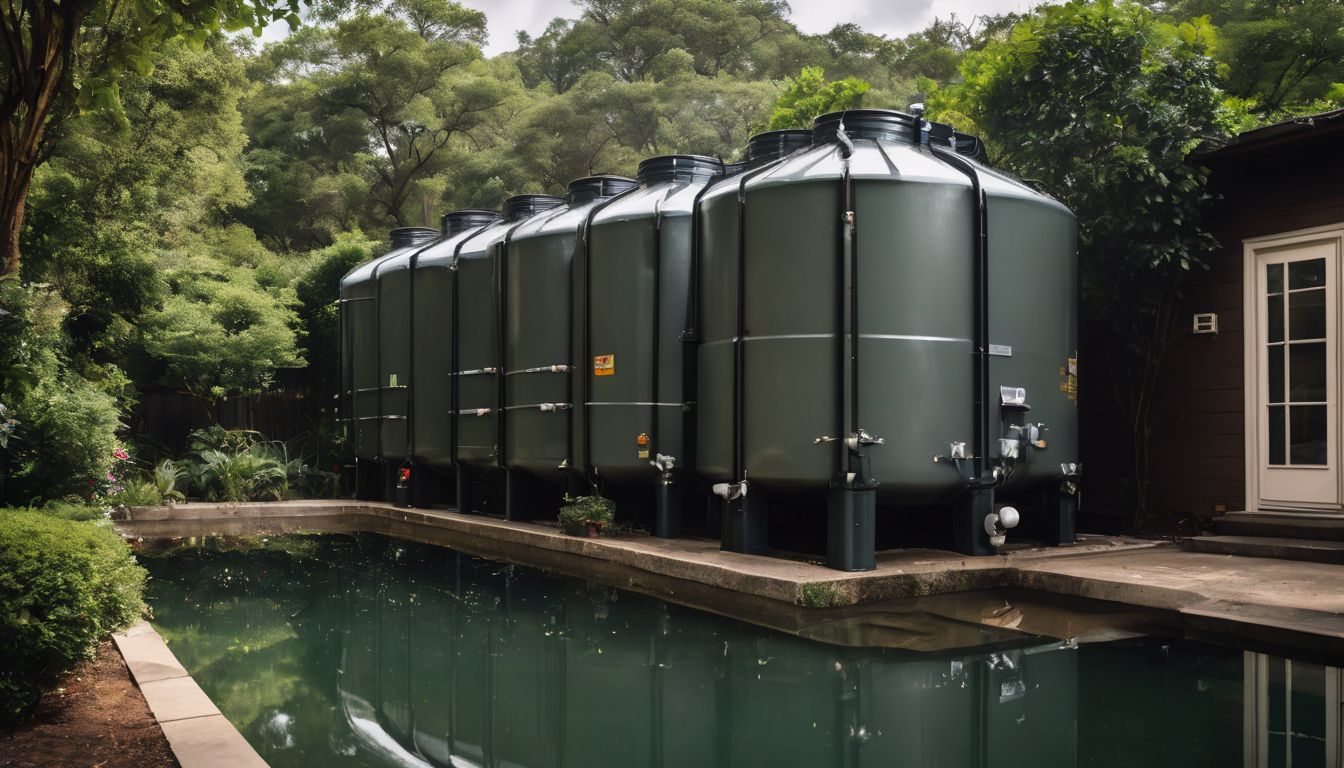Are you looking to make a difference in the world with your lifestyle choices? Every year, tonnes of waste pollute our planet, threatening wildlife and ecosystems. Our workshop guide offers practical steps to host events that promote sustainable living, helping you lead by example.
Let’s change the future together!
Key Takeaways
- To host an eco-friendly workshop, choose a sustainable topic like plastic-free living or zero waste practices and prepare thoroughly to ensure a smooth event.
- Select community venues for the workshop that support sustainability, with features like recycling facilities and energy-saving measures in place.
- Promote your sustainable living workshop using environmentally conscious methods such as social media and recycled materials for posters.
- Enhance the success of your event by overcoming nerves, adding a personal touch, considering carbon offsetting, and engaging attendees with interactive activities.
- Sustainable events benefit both the environment and businesses by reducing carbon footprints, attracting eco-conscious individuals, and fostering community stewardship in conservation efforts.
Understanding Sustainable Living Practices
Gain a deeper understanding of sustainable living practices, including plastic-free living and zero waste living. Discover how these practices can help reduce environmental impact and promote a more eco-friendly lifestyle.
Plastic-free living
Plastic-free living is a commitment to cutting out single-use plastics and adopting alternatives that are better for the planet. This lifestyle change can significantly reduce waste in landfills and oceans, leading to healthier ecosystems.
To start, swap plastic bags for reusable ones, choose glass or metal containers over plastic bottles and pack lunches in beeswax wraps rather than clingfilm.
Embracing this approach requires creativity and determination but offers immense benefits for both individuals and communities striving for environmental sustainability. With each step towards reducing plastic usage, attendees at sustainable living workshops will learn how seemingly small actions contribute to global conservation efforts.
Next on our journey through sustainable practices: exploring zero-waste living as a transformative way to minimise our environmental footprint.
Zero waste living
Transitioning from plastic-free living to zero waste living, individuals can make even greater strides in reducing their environmental impact. Zero waste living involves minimising one’s production of rubbish by reusing and repurposing items, composting organic waste, and choosing products with minimal packaging or those that are easily recyclable.
By embracing habits such as using reusable bags, bottles, and containers; buying in bulk to reduce packaging waste; and repairing or upcycling items instead of discarding them, people can significantly lower the amount of waste they contribute to landfills.
Furthermore, adopting a circular economy mindset means considering the entire lifecycle of products and actively seeking sustainable alternatives. This approach encourages repair over replacement, supporting businesses with take-back programmes for used goods, and advocating for extended producer responsibility.
Planning and Preparing for a Workshop
When planning and preparing for a workshop on sustainable living practices, it’s important to consider basic tips, as well as topic ideas for Plastic-Free July workshops and presentations on zero waste living.
This will ensure that the workshop is informative and engaging for participants.
Basic tips
Choose a compelling topic that resonates with your audience, such as plastic-free living or zero waste practices. Plan and prepare well in advance to ensure the workshop runs smoothly.
Consider eco-friendly venues that align with sustainable values and promote your event using cost-effective, environmentally conscious methods.
Topic ideas for Plastic-Free July workshops
After considering the basic tips for planning and preparing a workshop, here are some engaging ideas to incorporate into your Plastic-Free July workshops:
- “Plastic-Free Living 101“: Offer a comprehensive overview of plastic-free living, including practical tips on reducing plastic waste in daily life.
- “DIY Upcycling Workshop“: Teach participants how to repurpose common household items into useful and decorative items, reducing the need for new plastic purchases.
- “Sustainable Shopping Tour“: Organise a visit to local shops or markets that promote plastic-free products, offering participants actionable alternatives for their shopping habits.
- “Plastic-Free Cooking Class“: Demonstrate recipes and techniques that minimise the use of single-use plastics in the kitchen, empowering participants to make sustainable choices in their meals.
Topic ideas for a presentation on zero waste living
- Implementing a Zero Waste Lifestyle: Practical Tips for Beginners
- Sustainable Shopping: How to Reduce Packaging Waste in Everyday Purchases
- Composting and Organic Waste Management: Turning Food Scraps into a Resource
- Mindful Consumption: Strategies for Reducing Single-Use Items in Daily Life
- DIY Household Products: Making Your Own Zero Waste Cleaning and Personal Care Items
- Zero Waste Kitchen: Strategies for Minimising Food Packaging and Food Waste
- Creating a Minimalist Wardrobe: Fashion Choices that Reduce Textile Waste
Choosing a Location for Your Workshop
When choosing a location for your sustainable living workshop, consider community venues that align with eco-friendly considerations. This includes promoting the event and budgeting for any necessary expenses.
Community venues
Consider community centres, libraries, or local parks as potential venues for your sustainable living workshops. These spaces often offer affordable rental options and are easily accessible to members of the community.
When choosing a location, prioritise those that align with sustainable practices by offering recycling facilities, energy-efficient lighting, and waste reduction initiatives. Additionally, consider the ease of transportation to the venue to ensure minimal environmental impact for attendees.
Choosing a community venue not only supports local infrastructure but also reinforces the message of sustainability within the workshop itself. By utilising these communal spaces, you can showcase practical examples of eco-friendly practices and encourage attendees to incorporate such principles into their daily lives.
Eco-friendly considerations
When considering eco-friendly workshop hosting, it’s essential to choose a location that aligns with sustainable values. Look for venues with green energy sources and convenient access to public transportation.
Consider waste reduction strategies, such as providing recycling bins and using compostable materials. Additionally, make sure the location supports sustainable event transportation options, like bike racks and electric vehicle charging stations.
To further enhance your eco-friendly workshop, incorporate sustainability education into the planning process. Choose topics that promote natural living, renewable energy, or sustainable agriculture.
By prioritising environmentally friendly practices and embracing sustainable development in every aspect of your workshop hosting, you can inspire others to join the movement towards a greener future.
Promotion and budgeting
Eco-friendly considerations are essential for hosting a sustainable living workshop, and effective promotion and budgeting can help make the event successful. Here are some tips for promoting your workshop and managing your budget:
- Utilise social media platforms to spread the word about your workshop, using hashtags like #sustainableliving and #zerowaste to reach a wider audience.
- Collaborate with local environmentally conscious businesses to co-promote the event and potentially share costs for promotions.
- Design eye – catching posters and flyers made from recycled materials to promote the workshop in community spaces, such as local cafes or farmers’ markets.
- Consider offering early bird discounts or group rates to encourage more attendees while managing the budget effectively.
- Seek out sponsorship from eco – friendly brands or organisations that align with the workshop’s values, which can help cover some of the promotional and logistical costs.
Tips for Successful Workshop Hosting
Overcoming nerves, creating a personal touch and considering carbon offsetting are all important tips for hosting a successful sustainable living workshop. Read on to learn how to make your event impactful and eco-friendly.
Overcoming nerves
To host a successful sustainable living workshop, calming your nerves is essential. First, take a few deep breaths to relax and focus on the positive impact your workshop will have on the environment.
Visualise yourself confidently engaging with participants, sharing knowledge about plastic-free living or zero waste practices. Remind yourself of your expertise in sustainable living practices and draw strength from your passion for environmental conservation.
Embrace any nervous energy as excitement that will drive your enthusiasm during the workshop.
Creating a personal touch
Engage attendees by incorporating personal stories and experiences into your workshop. Use relatable examples to inspire action, such as sharing how small sustainable changes have made a big impact on your own life.
Encourage interaction by allowing participants to share their own eco-friendly practices, fostering a sense of community and connection. Incorporate hands-on activities that allow individuals to experience sustainable living practices firsthand, leaving a lasting impression and motivating them to make positive changes in their own lives.
Instil trust and authenticity by showcasing the behind-the-scenes efforts you’ve made to ensure the event aligns with sustainable principles. This could include using environmentally friendly materials for workshop materials, offering locally sourced refreshments, or utilising renewable energy sources for the venue.
Carbon offsetting
To further enhance the environmental impact of your sustainable living workshop, consider carbon offsetting. This practice involves compensating for carbon emissions by investing in projects that reduce or absorb an equivalent amount of greenhouse gases elsewhere.
By supporting initiatives such as reforestation, renewable energy generation, and methane capture, you can effectively counteract the carbon footprint associated with your event.
Not only does carbon offsetting showcase your commitment to environmental responsibility, but it also sets a positive example for attendees and encourages them to consider their own carbon footprint.
The Importance of Sustainable Events
Hosting sustainable events not only benefits the environment but also creates positive brand image and attracts environmentally conscious attendees. Understanding the importance of sustainability in event planning can help businesses make a positive impact on the planet while also boosting their reputation.
Benefits for business and the environment
Sustainable living workshops offer businesses the opportunity to showcase their commitment to environmental responsibility. By hosting eco-friendly events, companies can enhance their brand image and attract environmentally conscious customers.
Engaging in sustainable event planning also allows businesses to reduce their carbon footprint and contribute positively to the environment, aligning with the preferences of today’s eco-conscious consumers.
Implementing sustainable practices in event hosting not only benefits businesses but also has positive impacts on the environment. These workshops provide a platform for promoting waste reduction, green energy usage, and natural living practices.
Hosting for Sustainable Living Workshops: A Comprehensive Guide
When hosting sustainable living workshops, focus on creating a positive impact by sharing practical tips and actionable steps for eco-friendly living. Encourage participants to embrace plastic-free and zero waste practices in their daily lives through engaging activities and informative sessions.
By providing valuable resources and fostering a sense of community, you can inspire individuals to adopt sustainable habits that benefit both the environment and their well-being.
Emphasise the importance of incorporating real-life examples and case studies into your workshop curriculum, demonstrating the tangible benefits of embracing green energy, waste reduction, natural living, and business sustainability.
Conclusion
In conclusion, hosting a workshop on sustainable living practices empowers individuals to adopt eco-friendly habits. Participants can learn about zero waste living and plastic-free alternatives.
Sustainable events play a crucial role in promoting environmental consciousness. Embracing sustainable practices contributes to a healthier planet for future generations.
FAQs
1. What are some key themes for sustainable living workshops?
Sustainable living workshops can focus on a variety of themes, including zero waste practices, green energy solutions, and natural living methods that contribute to eco-friendly lifestyles.
2. How do I plan an environmentally friendly event like a sustainability workshop?
When planning an eco-friendly workshop or event, consider attendee preferences for sustainability such as waste reduction strategies and choosing venues that support business sustainability through environmentally sustainable practices.
3. Can businesses benefit from hosting their own sustainability workshops?
Yes, by organising business sustainability workshops, companies can demonstrate their commitment to the environment while educating employees and clients about sustainable practices in the workplace.
4. What should I include in a zero waste workshop?
A zero-waste workshop could offer practical tips on reducing waste at home and work with demonstrations on recycling techniques and promoting products that support zero-waste goals.
5. Are there creative ideas for making my green energy workshop engaging?
To make your green energy workshop stand out, incorporate interactive activities involving renewable energy sources and facilitate discussions on how adopting green technology can lead to long-term environmental benefits.





